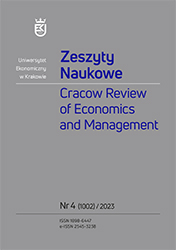Wyzwania współczesnego zarządzania zasobami ludzkimi – analiza polskojęzycznych ofert internetowych firm konsultingowych
Challenges in Contemporary HRM – An Analysis of Polish-Language Online Offers of Consulting Firms
Author(s): Janusz StrużynaSubject(s): Business Economy / Management, Management and complex organizations, Human Resources in Economy
Published by: Wydawnictwo Uniwersytetu Ekonomicznego w Krakowie
Keywords: Human Resources Management (HRM); theory-practice gap; consulting; cognitive and methodological challenges;
Summary/Abstract: Objective: To identify the challenges theorists of HRM face. Such challenges are hidden in the content of HRM consulting firm offers.Research Design & Methods: The analysis of the content of online offers of Polish consulting firms was based on general guidelines for qualitative research formulated by Saldana (2011), Charmaz (2009), and Silverman (2007).Findings: The analysis of the content of the offers revealed five categories and four dimensions considered by consultants to be of key importance to practitioners. These results organise and extend HRM issues in an original way.Implications / Recommendations: The synthesis of the categories and dimensions identified points to three topics that are emerging as a challenge for the “new normal” in HRM: 1) naturalisation of the language used in HRM, 2) the hidden logic of the improvement process and its consequences, 3) cognitive challenges that go beyond the concept of the simple mechanism of adapting theory to practice.Contribution: The research results contribute to the knowledge base on key challenges consultants see for improving HRM. The categories and dimensions of HRM improvement uncovered in the study differ from those discussed in other studies. Two new challenges for practitioners and researchers have emerged. The first concerns how to go about improving methods of analysing organisations and their management. In this respect, kaleidoscope-like thinking is recommended. Such an approach differs from thinking based on multidimensionality, complexity, and interdisciplinarity. The second challenge concerns improving theoretical knowledge by considering the practice of consulting companies working on the market. These issues have not been sufficiently described in the literature
Journal: Zeszyty Naukowe Uniwersytetu Ekonomicznego w Krakowie
- Issue Year: 1002/2023
- Issue No: 4
- Page Range: 135-151
- Page Count: 17
- Language: Polish

